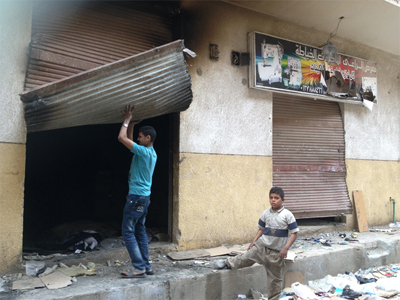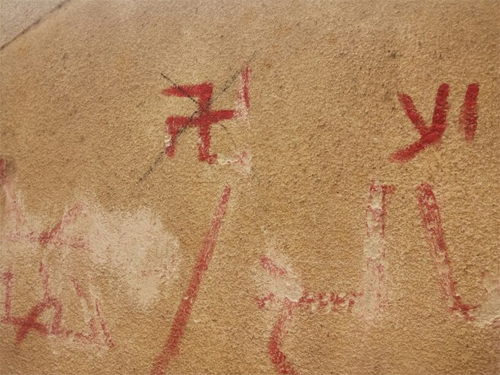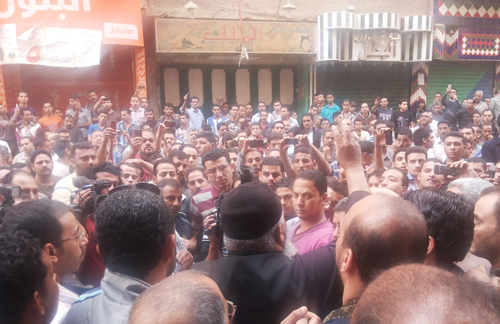Four days have passed since the violence that disrupted the town of Al-Khosous, home for Copts and Muslims in Egypt's governorate of Qalyubia who say they have never seen sectarian strife.
Shattered glasses, burnt cars, and damaged shops remind everyone of the four day-long clashes that left at least five Copts and one Muslim killed since Friday.
With confirmed cases of death, injuries and damages, the reasons that sparked the violence remain vague in the midst of conflicting reports.

Burnt shop with stolen appliances following Friday clashes (Photo: Nada El-Kouny)
"The main reason that fired up the violence on Friday was that a Muslim man, Mohamed Mahmoud, who was killed on Friday by a Coptic man, Nassim Farouq, had been making frequent sexual passes at a Coptic, married woman," Ayman a driver and an Al-Khosous resident told Ahram Online.
Ayman's sexual harassment story was echoed by several people who said that Mahmoud and Farouq had been arguing for months over the alleged behaviour.
In the aftermath of Mahmoud's death, Farouq's house was set on fire by unknown assailants.
Others embraced a different narrative, however.
Sixteen year-old Mostafa Abdel Wahab claimed that the problem started when a number of Coptic children drew the Nazi swastika on the walls of an Al-Azhar-affiliated institute on Friday afternoon, which angered some of the Muslim children who mistook it for a cross.
However, several residents expressed that this was not meant to be an offensive sign but rather a mere copying of a sign that the children had seen elsewhere drawn on walls and taxis.

Swastika sign confused by some of being a cross drawn on the wall of an institute affiliated with Al-Azhar (Photo: Randa Ali)
In any case, a number of people, both Copts and Muslims, accused the Imam of Hoda Al-Nabwi mosque in the village of inciting the violence.
"The one who really caused problems was the sheikh of that mosque who called on all Muslims to head to the streets and stand armed to fight all Christian members of the community," said Ayman.
Emad, another resident, seconded Ayman's statement detailing that the sheikh called on Muslims to carry their weapons to "defend their Muslim brothers against the Copts."
Meanwhile, Mahmoud's uncle, Mostafa Hassan stuck to the story of the children drawing the swastika, adding that the dispute was escalated by Samir Iskandr – Farouk's relative – who walked around firing shots randomly, killing Mahmoud.
"We hurried to the hospital to rescue him [Mahmoud]. When we returned, the town was in chaos; houses and shops were on fire. We don't know who started it," added Hassan.
Hassan adds that Iskandar has long had a reputation of picking trouble with Muslims.
Bishop Suriel Yonan of Mar Girgis Church in Khosous, stressed that the violence initially erupted for personal - not sectarian reasons - referring to the dispute between Mahmoud and Nassim.
"In every country there is a chance for crime to occur, but the issue is that a personal problem that has nothing to do with religion develops into sectarian strife. This is collective punishment," concluded Yonan, adding that "someone" is benefiting from feeding into this strife.
Mahmoud's death left the city drowning in horror for days, with residents saying snipers on rooftops shot intermittently at pedestrians for two days.
By Friday night four Copts were killed and the forensic report attributes their death to live ammunition. Later on Sunday another Coptic man was announced dead.
"The people of Al-Khosous are poor and everyone knows that. Who in Al-Khosous has the money to spend on the bullets? In one day more than 2000 bullets were shot between 1am - 7am. This is almost worth LE50,000 ($7,300). Who paid for this?" Yonan demands to know.
"Someone is spending this money to incite hostility between Muslims and Christians, to give room for extremists to manipulate them," argued Yonan.
On Monday, the Muslim Brotherhood's Freedom and Justice Party (FJP) released a statement condemning the violence in Al-Khosous, suggesting that the chaos it caused was deliberate.
"The latest incidents are aimed at dragging the nation into chaos, [a state of affairs] from which only Egypt's enemies and their agents will benefit," added the statement.
Representatives of the Muslim Brotherhood, Coptic Orthodox Church, Salafist and Al-Azhar met on Saturday in an attempt to resolve the ongoing crisis.
"Our meeting resulted in several recommendations: one of them is to call on promoting a compassionate discourse in both mosques and churches in order to calm people down and, hence, we can give the police a chance to work and protect the church," revealed Yonan. He also complained that none of those present have fulfilled their promise, adding that shots broke out only one hour after the delegations left.
On Monday afternoon, Yonan spoke to the tens of Copts who had gathered in front of Mar Girgis Church to protect it from potential attacks, urging them to leave so the police could do their job.

Bishop Suriel Yonan of Mar Girgis Church speaks to Al-Khosous residents Monday afternoon to call for end of violence (Photo: Randa Ali)
Many people in Al-Khosous slammed the police for failing to protect them.
"The police had an active role to play in the violence, since they were initially standing 100 metres away from the church the sheikh had called on people to burn. They left all the side streets empty and stood far from the church so when the violence would escalate between the Muslims and Christians, the Christians would get caught in the middle," forty-six-year-old Milad Saad told Ahram Online.
Ayman, however, believes that the police were merely to stand by so as to not get involved in the violence. Whenever anyone asked them to stop the clashes they would state they do not have orders to arrest or shoot. "The only time they truly got involved was last night after one of their men was injured in the crossfire."
"Sunday at dawn armed people were standing on top of the buildings. We told the police and they did nothing," Emad, an eyewitness told Ahram Online.
However, Bishop Yonan believes that the police were very cautious not to take any sides.
"The police have done what they could. But, our kids who stood to protect the church got in the way of [the police] doing their job."

Police deployed outside Baptist Church in Al-Khosous which was attempted to be burnt Friday as a result of violence (Photo: Nada El-Kouny)
While the narratives differ on what incited the violence, the people of Al-Khosous agree and stress that this is the first time sectarian strife has knocked on their doors.
"I am a Muslim and have been living here for 30 years and my clients are mostly Christians. We never thought of ourselves as 'Christians' or 'Muslims' here. This strife that crawled into our neighbourhood is unfamiliar," said Yehia Zakarya, a barber.
During the past two years, at least twenty incidents of sectarian violence have occurred in Egypt, leaving many Copts dead or forced to leave their homes.
Notably, most of the sectarian incidents have been stimulated by personal disputes or rumours of forced conversion.
Short link: